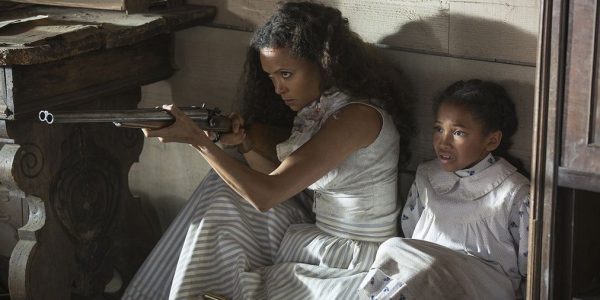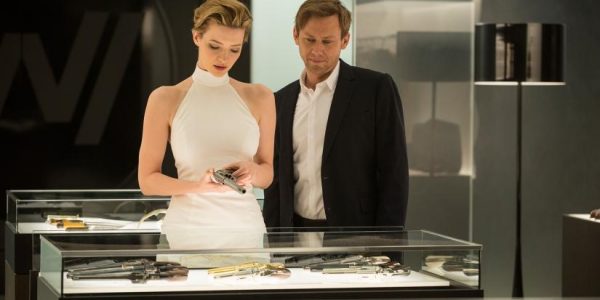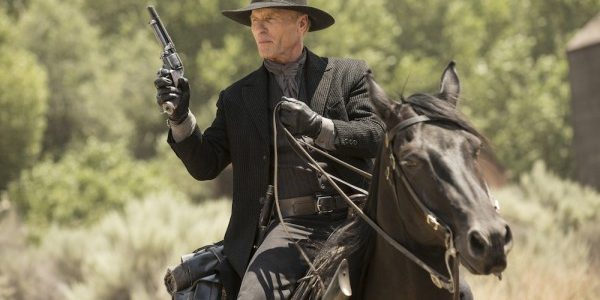Westworld – Chestnut Review
While the second episode of
Westworld, entitled "Chestnut," still left us with far more questions than answers, it was a step in the right direction, giving the spotlight to the very capable Thandie Newton and Jimmi Simpson. We were also given a look into how participants enter the Westworld park - and, if William's friend is meant to be a stand-in for the majority of guests who arrive for a fun and violence-filled vacation, a look into what a park guest expects from the various hosts (namely lots of sex and a chance to kill).
Newton's host character, Maeve, might just be more interesting than Dolores, but for completely different reasons. While we know that Dolores is certainly glitching and gaining some form of sentience (and has been apparently been having off-the-record chats with Jeffrey Wright's Bernard), what is happening with Maeve is quite a bit more confusing. Is she reliving a memory of the Man in Black attacking her and her daughter as the result of Dolores quoting Shakespeare out of turn to her? Is that simply a nightmare the techs have left in place (as Elsie mentioned they often do)? Or is it something else, perhaps hinting at the Man in Black's true identity (we were also handed a small additional clue regarding that, namely, that he is allowed to do whatever he likes by park management and is a guest, not a host, as some have speculated).

The treatment of Maeve by the various technical teams within the Westworld tech department was also telling as to how each group thinks about the hosts. To the Narrative Team, they are simply the means to tell their stories. Ratcheting up her aggression as a means to get guests to sleep with her wasn't the best choice, as Elsie aptly deduced. Security, on the other hand, was ready to throw her on the scrap heap without really running a major diagnostic as to what might be the cause of the malfunctions. And it took the Programming Team, and the intriguing Elsie - who, as we saw in the pilot, might have too close of a relationship with some hosts - to figure out that there was something deeper at work. Now, I don't believe for a second the real problem has been located and fixed, but at least we know who wants to protect the hosts and who thinks of them simply as moving dolls - something that might come in handy down the line.
As for Simpson's William, I'm more intrigued than a would normally be about the character due to Simpson playing him. Simpson is a master at crafting sad, misunderstood nerds and giving them layers one never thought were present (recall his work on
House of Cards as the hacker who almost brought down Frank Underwood). So far, William seems to be the audience surrogate, the good guy who doesn't want to screw all of the hosts and then shoot them in the head once he's done with them. I assume he will eventually become embroiled in whatever calamity arises from the Man in Black's actions and the increased sentience in the hosts, and will eventually become the hero in the piece - or at least one of the heroes. And while that is a fairly obvious trope, I have faith that Simpson can sell whatever he will be asked to handle, much like the majority of this excellent cast.

Less successful this week was the Man in Black's arc. He's searching for a maze that at least two of the hosts know of. Which, naturally, begs the question of whether or not this is a legitimate quest to figure out how Westworld works on a deeper level, or if this is simply another adventure created by the narrative team that he's playing out. Westworld is, after all, a park to allow the guests to experience their baser instincts and walk the well-trodden paths of adventures they know and understand (per Dr. Ford's speech to the assembled Narrative Team). It isn't a place for the guests to discover things about themselves (although, considering William's friend told him Westworld was for him to discover his true self, perhaps that is what the park is promising guests who visit). My main worry with this arc is that won't resolve itself in any really satisfying way. The Man in Black, despite coming into contact with Dolores in the pilot, is very isolated in his own arc, away from the bulk of the narrative action both in and outside of the park. All of the other characters are interacting with each other in various ways, yet he is on his own path. Unless the maze somehow leads him back into the main story, it appears to be a regression that doesn't make much sense at the moment.
All-in-all, "Chestnut" was a successful episode. There is a great deal of world building required to make
Westworld work on all the levels it wants to travel on, and this episode did a lot to continue laying the bricks to help us better understand how the park operates. The main issue with the series- that we know the hosts will, at a point in the future, rebel- still is hanging over the series, but so long as the show continues to make me care about its characters and fleshes them out in meaningful ways, I'm willing to let that slide.
 Final Thoughts:
Final Thoughts:
-- While the Dolores glitch showed us there's a gun buried in the backyard (and we all know what happens when there's a gun in the backyard according to Chekhov), her actions throughout the episode weren't particularly illuminating. Although, one might posit that her nightmare in the street and the finding of the gun hint that perhaps Dolores will use it to mow down hosts - or guests - at some point in the future (or that she did so once in the past).
-- I'm not sure how I feel about the affair between Bernard and Theresa. While it adds something to both characters, it's pretty pointless, considering neither one really seems to be all that into the relationship.
-- I'm certainly intrigued about Dr. Ford's conversation with, what I assume was, his younger self. I'm also interested in how and why such a character was created, and how much control Ford has over the creative aspect of Westworld.
Pros
- Thandie Newton/Maeve
- Jimmi Simpson/William
- The nightmares/flashbacks
Cons
- Man in Black is still not connecting with the rest of the story

 Less successful this week was the Man in Black's arc. He's searching for a maze that at least two of the hosts know of. Which, naturally, begs the question of whether or not this is a legitimate quest to figure out how Westworld works on a deeper level, or if this is simply another adventure created by the narrative team that he's playing out. Westworld is, after all, a park to allow the guests to experience their baser instincts and walk the well-trodden paths of adventures they know and understand (per Dr. Ford's speech to the assembled Narrative Team). It isn't a place for the guests to discover things about themselves (although, considering William's friend told him Westworld was for him to discover his true self, perhaps that is what the park is promising guests who visit). My main worry with this arc is that won't resolve itself in any really satisfying way. The Man in Black, despite coming into contact with Dolores in the pilot, is very isolated in his own arc, away from the bulk of the narrative action both in and outside of the park. All of the other characters are interacting with each other in various ways, yet he is on his own path. Unless the maze somehow leads him back into the main story, it appears to be a regression that doesn't make much sense at the moment.
All-in-all, "Chestnut" was a successful episode. There is a great deal of world building required to make Westworld work on all the levels it wants to travel on, and this episode did a lot to continue laying the bricks to help us better understand how the park operates. The main issue with the series- that we know the hosts will, at a point in the future, rebel- still is hanging over the series, but so long as the show continues to make me care about its characters and fleshes them out in meaningful ways, I'm willing to let that slide.
Less successful this week was the Man in Black's arc. He's searching for a maze that at least two of the hosts know of. Which, naturally, begs the question of whether or not this is a legitimate quest to figure out how Westworld works on a deeper level, or if this is simply another adventure created by the narrative team that he's playing out. Westworld is, after all, a park to allow the guests to experience their baser instincts and walk the well-trodden paths of adventures they know and understand (per Dr. Ford's speech to the assembled Narrative Team). It isn't a place for the guests to discover things about themselves (although, considering William's friend told him Westworld was for him to discover his true self, perhaps that is what the park is promising guests who visit). My main worry with this arc is that won't resolve itself in any really satisfying way. The Man in Black, despite coming into contact with Dolores in the pilot, is very isolated in his own arc, away from the bulk of the narrative action both in and outside of the park. All of the other characters are interacting with each other in various ways, yet he is on his own path. Unless the maze somehow leads him back into the main story, it appears to be a regression that doesn't make much sense at the moment.
All-in-all, "Chestnut" was a successful episode. There is a great deal of world building required to make Westworld work on all the levels it wants to travel on, and this episode did a lot to continue laying the bricks to help us better understand how the park operates. The main issue with the series- that we know the hosts will, at a point in the future, rebel- still is hanging over the series, but so long as the show continues to make me care about its characters and fleshes them out in meaningful ways, I'm willing to let that slide.
 Final Thoughts:
-- While the Dolores glitch showed us there's a gun buried in the backyard (and we all know what happens when there's a gun in the backyard according to Chekhov), her actions throughout the episode weren't particularly illuminating. Although, one might posit that her nightmare in the street and the finding of the gun hint that perhaps Dolores will use it to mow down hosts - or guests - at some point in the future (or that she did so once in the past).
-- I'm not sure how I feel about the affair between Bernard and Theresa. While it adds something to both characters, it's pretty pointless, considering neither one really seems to be all that into the relationship.
-- I'm certainly intrigued about Dr. Ford's conversation with, what I assume was, his younger self. I'm also interested in how and why such a character was created, and how much control Ford has over the creative aspect of Westworld.
Final Thoughts:
-- While the Dolores glitch showed us there's a gun buried in the backyard (and we all know what happens when there's a gun in the backyard according to Chekhov), her actions throughout the episode weren't particularly illuminating. Although, one might posit that her nightmare in the street and the finding of the gun hint that perhaps Dolores will use it to mow down hosts - or guests - at some point in the future (or that she did so once in the past).
-- I'm not sure how I feel about the affair between Bernard and Theresa. While it adds something to both characters, it's pretty pointless, considering neither one really seems to be all that into the relationship.
-- I'm certainly intrigued about Dr. Ford's conversation with, what I assume was, his younger self. I'm also interested in how and why such a character was created, and how much control Ford has over the creative aspect of Westworld.